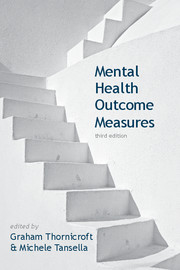Book contents
- Frontmatter
- Contents
- List of tables, boxes and figures
- List of contributors
- Foreword
- Foreword
- Preface: an evolving perspective of mental health outcome measures
- Part I Methodological issues
- Part II Domains of outcome measurement
- 5 Global functioning scales
- 6 Satisfaction with mental health services
- 7 Measuring family and carer burden in severe mental illness: the instruments
- 8 Measures of quality of life for persons with severe mental disorders
- 9 Measuring social disabilities in mental health and employment outcomes
- 10 Measuring the costs of mental healthcare
- 11 Assessing needs for mental healthcare
- 12 Measuring stigma and discrimination related to mental illness
- Part III Symptom severity outcome measures
- Part IV International approaches to outcome assessment
- Index
5 - Global functioning scales
from Part II - Domains of outcome measurement
Published online by Cambridge University Press: 02 January 2018
- Frontmatter
- Contents
- List of tables, boxes and figures
- List of contributors
- Foreword
- Foreword
- Preface: an evolving perspective of mental health outcome measures
- Part I Methodological issues
- Part II Domains of outcome measurement
- 5 Global functioning scales
- 6 Satisfaction with mental health services
- 7 Measuring family and carer burden in severe mental illness: the instruments
- 8 Measures of quality of life for persons with severe mental disorders
- 9 Measuring social disabilities in mental health and employment outcomes
- 10 Measuring the costs of mental healthcare
- 11 Assessing needs for mental healthcare
- 12 Measuring stigma and discrimination related to mental illness
- Part III Symptom severity outcome measures
- Part IV International approaches to outcome assessment
- Index
Summary
Mental health professionals have increasingly come to view mental illness not simply as a sum of its symptoms, a reduction in which will translate to an independent, successful individual with a high quality of life. This is especially true in the case of schizophrenia, but applies to virtually all neuropsychiatric/mental health conditions. Both patients and their families have repeatedly identified social and occupational functioning as equally important to them as symptom reduction. Individuals often have difficulties with employment, education, fulfilling basic roles such as spouse or parent and even everyday tasks like negotiating a transport system. In this chapter, we review assessment schedules used among psychiatric populations that are intended to provide a measure of a person's level of functioning in all or nearly all areas of life.
Global functioning is now seen as a legitimate target for clinical interventions, both psychosocial and pharmacological. However, global functioning itself is a rather vague and abstract concept that tries to encompass a broad canvas of behaviour and abilities, but can include social functioning, vocational functioning and independent living skills. There is a close and complex relationship between mental illness and impairment of global functioning. Cognitive deficits, such as in memory, attention and psychomotor speed, all contribute to poor functioning. At the same time, the overt symptoms of mental illness such as delusions or depression can also contribute directly to poor functioning, for instance through negative social interactions or the inability to maintain a job. Although impairment of functioning is usually viewed as a consequence of mental illness, it may at times be a significant causal or maintaining factor in specific disorders. Measuring this construct is further complicated by ‘real world’ restrictions such as limited financial resources, disincentives to seek employment and restricted housing options, which can all prevent someone achieving their full potential.
One model helpful in the conceptualisation of global function is reported by McKibben et al (2004). It is a threefold concept:
impairments – body level (e.g. brain structure, cognitive and psychiatric deficits)
limitations – person as a whole (e.g. difficulty with mental calculations such as fluid speech)
participation restrictions – person in social contexts (e.g. no opportunities in job market).
- Type
- Chapter
- Information
- Mental Health Outcome Measures , pp. 83 - 98Publisher: Royal College of PsychiatristsPrint publication year: 2010



